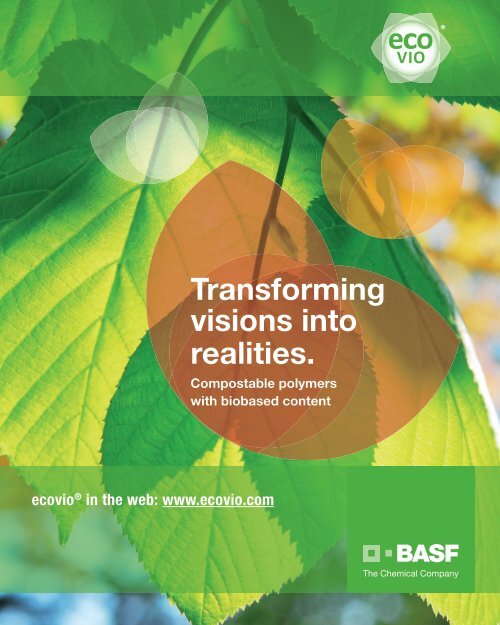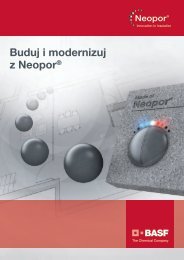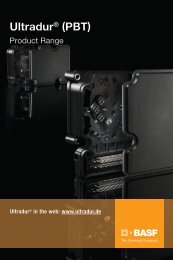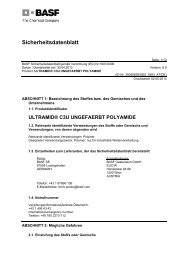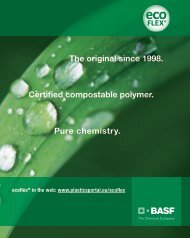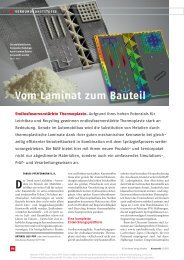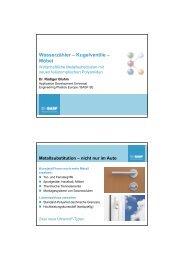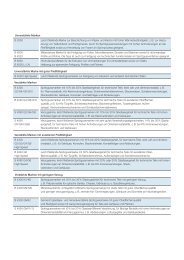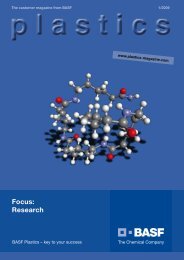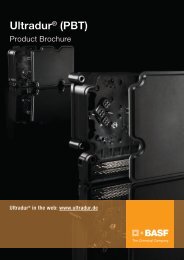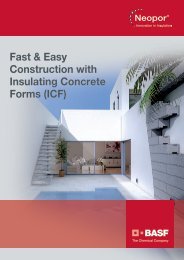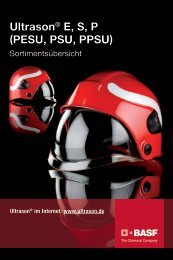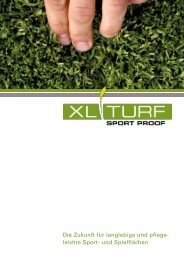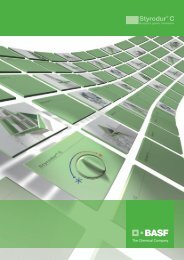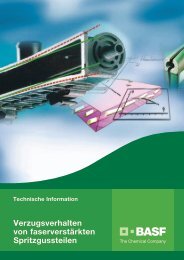ecovio - BASF Plastics Portal
ecovio - BASF Plastics Portal
ecovio - BASF Plastics Portal
Create successful ePaper yourself
Turn your PDF publications into a flip-book with our unique Google optimized e-Paper software.
Transforming<br />
visions into<br />
realities.<br />
Compostable polymers<br />
with biobased content<br />
<strong>ecovio</strong> ® in the web: www.<strong>ecovio</strong>.com
This is<br />
<strong>ecovio</strong> ®<br />
Compostable polymer<br />
with biobased content<br />
<strong>ecovio</strong> ® is a high-quality and versatile bioplastic of <strong>BASF</strong>.<br />
The primary advantages it’s certified compostable and<br />
contains biobased content.<br />
2
<strong>ecovio</strong> ® :<br />
<br />
is a finished compound<br />
certified compostable worldwide<br />
has a variable biobased content<br />
<br />
is printable and weldable<br />
The main areas of use for <strong>ecovio</strong> ® are plastic films<br />
such as organic waste bags, dual-use bags (first<br />
for shopping, then for organic waste) or agricultural<br />
films. Furthermore, compostable packaging<br />
solutions such as paper-coating, shrink films,<br />
foam packaging and injection molding products<br />
can be produced with <strong>ecovio</strong> ® .<br />
<strong>ecovio</strong> ® is highly transformable, meaning a<br />
wide range of end use applications are possible.<br />
This makes organic waste diversion easier for<br />
stadiums and large venues, where a variety of<br />
compostable food service packaging is required.<br />
An innovative mix of proven ingredients<br />
With <strong>ecovio</strong> ® , <strong>BASF</strong> offers a certified compostable<br />
polymer which at the same time has a variable<br />
biobased content. The biobased portion can be<br />
adjusted to suit client requirements.<br />
<strong>ecovio</strong> ® consists of the compostable <strong>BASF</strong> polymer<br />
ecoflex ® and polylactic acid (PLA), which is<br />
derived from corn. In contrast to simple starch<br />
based bioplastics, <strong>ecovio</strong> ® is more resistant to<br />
mechanical stress and moisture.<br />
Ready for use<br />
<strong>ecovio</strong> ® is a finished product that can be used by<br />
the customer as a drop-in solution with standard<br />
plastic production procedures. Additional blending<br />
is therefore not required.<br />
High performing and certified compostable<br />
<strong>ecovio</strong> ® products are just as high-performing<br />
and strong in use as conventional plastics. An<br />
<strong>ecovio</strong> ® bag can take the same load as its polyethylene<br />
counterpart. The product properties<br />
were designed such that the products only fully<br />
biodegrade in compost after use.<br />
3
One step ahead<br />
together<br />
As a leading provider of high quality and high-performing plastics,<br />
<strong>BASF</strong> has been researching biodegradable and biobased Polymers<br />
for more than a decade.<br />
The continual development of innovative plastic solutions<br />
and the improved functionality of the products<br />
occurs in close cooperation with internal <strong>BASF</strong> units<br />
as well as with external partners.<br />
There are no general advantages or disadvantages<br />
to fossil or renewable resources. For each individual<br />
application, environmental safety, cost efficiency<br />
and the social consequences for a product’s entire<br />
life cycle must be examined, for example as part of<br />
an eco-efficiency analysis. Compostable or biobased<br />
polymers are generally not more environmentally<br />
friendly than others. They are, however, the optimal<br />
solution for particular applications – organic waste<br />
bags, compostable packaging for food or sub-arable<br />
agricultural films to name a few.<br />
4
What is meant by bioplastics?<br />
based on renewable raw materials<br />
Bio-pe, Bio-pa,<br />
Bio-pur, Bio-pp, Bio-pvc<br />
PLA, PHA<br />
not compostable<br />
compostable<br />
PE, PP, PVC<br />
PBS<br />
on a fossil basis<br />
Source: cf. Hans-Josef Endres, Technische Biopolymere, 2009.<br />
Two different groups of products fall under the term “bioplastics”: “biobased” and<br />
“compostable” plastics.<br />
Biobased materials are partly or entirely made of renewable raw materials. Polylactic acid,<br />
polyhydroxyalkanoate (PHA), starches, cellulose, chitin and gelatin for example, belong to this<br />
group. Biobased plastics can be biodegradable – but they are not always. Numbering among<br />
the biobased but not biodegradable plastics are biopolyethylene, natural fiber plastics, and<br />
composites of wood and plastic.<br />
Compostable plastics can be completely biodegraded by microorganisms. Special bacteria<br />
give off enzymes which break down the material’s flexible polymer chains into small parts.<br />
These are then digested by the bacteria together with other organic material such as, for example,<br />
organic waste. Water, carbon dioxide and biomass remain. Compostable polymers can, but<br />
need not be produced from renewable raw materials. They can also be based on crude oil.<br />
The biodegradability does not depend on the raw material, rather, it depends entirely on the<br />
chemical structure of the polymer.<br />
5
Completely<br />
compostable<br />
Thanks to a special chemical structure, <strong>ecovio</strong> ® can be degraded<br />
by microorganisms and their enzymes.<br />
In the conditions of an industrial composting plant – high temperature, high moisture, defined oxygen<br />
content – biodegradation only takes a few weeks.<br />
Biodegradation of a compostable<br />
film in the first week ...<br />
... in the second week ... ... and in the fourth week<br />
6
Advantages of the separate collection of organic waste:<br />
Incinerating organic kitchen waste is not an effective option, because its high water content yields virtually<br />
no energy value whatsoever. It is worse when organic waste is disposed to landfills. There they produce<br />
methane, which has a 20 times more effective greenhouse gas potential than carbon dioxide.<br />
Composting organic waste can therefore reduce the production of greenhouse gases. According to calculations<br />
resulting from an eco-efficiency analysis, the composting of <strong>ecovio</strong> ® -coated paper tableware, even<br />
with small amounts of food remains, brings along environmental benefits compared to disposal to landfill.<br />
Furthermore, compost can prevent soil erosion and be used to improve soil fertility. It contains the valuable<br />
and very limited phosphate, which is used for fertilization.<br />
<strong>ecovio</strong> ® bags – proved thousands of times across the planet<br />
<strong>BASF</strong> has tested the use and composting of <strong>ecovio</strong> ® bags in various conditions in composting projects all<br />
over the world. The results show that the bag material biodegrades without any problems in different industrial<br />
composting sites, without adversely affecting the quality of the compost. When asked, residents<br />
of the respective regions also report positively on the clean and hygienic collection of organic waste.<br />
You can find additional information on<br />
www.<strong>ecovio</strong>.com/projects<br />
7
Tested and certified<br />
The compostability of <strong>ecovio</strong> ® has been certified by recognized<br />
and independent test institutes.<br />
Certified by test institutes<br />
Independent institutes test bioplastics in special<br />
certification procedures with respect to complete<br />
biodegradability, compostability, compost quality<br />
and plant compatibility.<br />
Only when a material meets the clearly defined<br />
test criteria may it be identified as compostable.<br />
Proven in practice<br />
Practical tests at industrial composting plants show<br />
that <strong>ecovio</strong> ® bags can be processed within three to<br />
four weeks.<br />
Suitable for food<br />
<strong>ecovio</strong> ® offers product grades that comply with the<br />
requirements of the European food contact regulation¹<br />
as well as the US Food Contact Substance Notification ²<br />
and are suited for food packaging among other things.<br />
<strong>ecovio</strong> ® offers various product grades that conform to the following international and national standards<br />
and norms for composting, among others:<br />
European standard<br />
EN 13432<br />
Australian standard<br />
AS 4736<br />
American<br />
standard<br />
ASTM 6400<br />
Japanese<br />
standard<br />
GreenPla<br />
European<br />
standard<br />
EN 13432<br />
Home<br />
composting<br />
1<br />
Commission Regulation (EU) No. 10/2011 of January 14, 2011 on<br />
materials and objects of plastic, designed to be in contact with food.<br />
2<br />
According to Food Contact Substance Notification No. 178, 475<br />
and 907 of FDA<br />
8
<strong>ecovio</strong> ® bag filled with organic waste<br />
Complete biodegradation to:<br />
• Water<br />
• CO 2<br />
• Biomass<br />
“Oxo-degradable” bag filled with organic waste<br />
• No complete biodegradation<br />
(does not comply with international composting standards)<br />
• Disintegration to plastic fragments (PE)<br />
• Premature loss of mechanical properties upon<br />
exposure to strong light<br />
Bio-polyethylene (PE) bags filled with organic waste<br />
• Biodegradation impossible<br />
• Disposal to landfill<br />
(prohibited in some European countries)<br />
• Incineration (not appropriate due to the high content<br />
of water in organic waste)<br />
“Oxo-degradable” plastics and bio-polyethylene plastics are not compostable<br />
“Oxo-degradable” PE films are conventional plastics which only decompose with the addition of special<br />
additives. Triggered by exposure to UV or heat, they oxidize the polymer chains and break them up into<br />
smaller fragments. To date it has not been possible to scientifically prove any biodegradability of these<br />
PE fragments after decomposition that meets the composting standards, whether or not the materials<br />
were pretreated with UV radiation or heat.<br />
Bio-polyethylene (PE) plastics are made with renewable resources. But they too are not biodegradable.<br />
Compostability does not depend on the origin of the raw materials, but on the chemical structure of<br />
the polymer.<br />
9
More than just<br />
a biopolymer<br />
Added value for our customers and partners.<br />
Closed-Loop System: Compostable food service<br />
packaging for stadiums and large venues<br />
Due to its wide variety of end use applications, <strong>ecovio</strong> ®<br />
can be used to develop comprehensive system solutions.<br />
The Closed-Loop System approach is a good<br />
example. In stadiums, for example, only certified<br />
compostable food service packaging made with<br />
<strong>ecovio</strong> ® or <strong>ecovio</strong> ® coated paper tableware is used.<br />
These can either be cups, plates, or straws. After use,<br />
the compostable tableware and remaining food are<br />
collected in compostable <strong>ecovio</strong> ® waste bags, then<br />
converted into valuable compost at a composting plant.<br />
The compostability of the material is a particularly<br />
useful disposal alternative for heavily soiled disposable<br />
tableware with lots of food remains. Recycling is too<br />
costly and disposal to landfill, due to methane gas<br />
formation, brings along environmental disadvantages.<br />
Advantages of the Closed-Loop System: Thanks to<br />
a stadium’s enclosed nature, it is possible both to<br />
prevent foreign materials from entering the loop, and<br />
also to ensure the proper disposal of the compostable,<br />
single-use items.<br />
<strong>ecovio</strong> ® in compostable multilayer films<br />
In combination with other <strong>BASF</strong> technologies, certified<br />
compostable multilayer films can be produced<br />
with <strong>ecovio</strong> ® . Due to its good barrier properties, these<br />
films are suited to a wide range of food packaging, and<br />
at the same time offer an alternative end-of-life option.<br />
Together with the Major League baseball team Seattle<br />
Mariners, <strong>BASF</strong> introduced a completely compostable<br />
peanut bag into the Safeco Field’s existing closed loop<br />
system.<br />
You can find additional information<br />
on our projects all over the world at<br />
www.<strong>ecovio</strong>.com/projects<br />
10
SW<br />
SE<br />
Multiple options:<br />
Even after use<br />
With <strong>ecovio</strong> ® , <strong>BASF</strong> is not only a raw material<br />
supplier, but also supports partners right across<br />
the value chain and over the entire product life<br />
cycle – from production to consumption and<br />
onto disposal. According to the application,<br />
<strong>ecovio</strong> ® products make different end-of-life<br />
options possible, such as composting or recycling<br />
(e.g. with <strong>ecovio</strong> ® PS for paper coating).<br />
Eco-efficiency:<br />
Consulting and service<br />
For which applications is the use of compostable<br />
polymers sensible and truly sustainable? More<br />
and more, industry, consumers and politicians<br />
are confronted with this question. <strong>BASF</strong> has a<br />
vast pool of competence and expertise in ecoefficiency<br />
and life cycle analyses. By comparing<br />
the ecological foot print of various product alternatives,<br />
it can be examined which product offers<br />
what environmental advantages.<br />
NW<br />
N<br />
NE<br />
W<br />
E<br />
S<br />
11
One biopolymer –<br />
many applications<br />
<strong>ecovio</strong> ® can be used for several purposes.<br />
Application<br />
Organic waste<br />
bags and<br />
shopping bags<br />
Mulch films<br />
Paper-coating<br />
Shrink film<br />
applications<br />
Foam packaging<br />
Thermoformed<br />
packaging<br />
Injection molding<br />
applications<br />
12
<strong>ecovio</strong> ® for organic waste<br />
bags and shopping bags<br />
Organic waste bags / shopping bags<br />
<strong>ecovio</strong> ® offers certified compostable and mostly biobased polymer<br />
resins for film applications.<br />
Compostable shopping bags offer the customer<br />
an additional advantage. They are not only strong<br />
enough to be used many times as a shopping<br />
bag: In their final phase, the bags can be used<br />
for collection of organic waste.<br />
Whether shopping bag or organic waste bag<br />
- kitchen and food waste can be collected hygienically<br />
in <strong>ecovio</strong> ® bags, then turned, together<br />
with the bag, into compost. Undesirable odor<br />
and pest infestation are prevented. Thanks to<br />
its good wet strength, liquid from teabags or<br />
the remains of fruit do not leak through, so there<br />
is no more laborious scrubbing of the organic<br />
waste bin.<br />
The compostable product grade <strong>ecovio</strong> ® FS is<br />
a new development from <strong>BASF</strong>: The material<br />
mainly consists of renewable raw materials and<br />
can be composted even faster. In Germany, bags<br />
made from this material can be used for the collection<br />
of organic waste in accordance with the<br />
German Biowaste Ordinance at the end of 2011.<br />
Mostly biobased<br />
Usable on blown film equipment for LDPE<br />
Elastic<br />
Moisture and tear resistant<br />
13
<strong>ecovio</strong> ® for<br />
mulch films<br />
‘<strong>ecovio</strong> ® M’ was specially developed for film applications in farming<br />
and gardening.<br />
The advantage: The farmer does not have to<br />
laboriously collect the mulch films after harvest,<br />
but can plow it in directly. This saves time and<br />
money. Because of its excellent mechanical<br />
properties, <strong>ecovio</strong> ® M offers a high downgauging<br />
potential and is optimally suited to different film<br />
applications, such as mulch, covering and silage<br />
films.<br />
<strong>ecovio</strong> ® M is suitable for the production of black,<br />
transparent and colored mulch films. Films made<br />
of <strong>ecovio</strong> ® M can also be specifically produced<br />
for different harvest cycles and climate conditions<br />
(2 component system).<br />
Drop-in solution: Simple processing on<br />
conventional PE equipment<br />
The ready for use compound already contains<br />
anti-blocking agents and enables simple processing<br />
as a drop-in solution on conventional<br />
PE equipment.<br />
High down-gauging potential<br />
Can be directly plowed in<br />
Offers protection against weeds<br />
14
Paper coatings<br />
<strong>ecovio</strong> ® for<br />
paper coatings<br />
Mulch films<br />
‘<strong>ecovio</strong> ® PS’ was specially developed for<br />
coating paper and paperboard.<br />
The certified compostable and mostly biobased<br />
polymer has multiple advantageous properties.<br />
In extrusion coating, <strong>ecovio</strong> ® PS offers a low coating<br />
thickness at high coating rates and process<br />
stability. The excellent adhesion of <strong>ecovio</strong> ® PS to<br />
many types of paper and paperboard, its temperature<br />
stability up to 100 °C and sealing capacity<br />
comparable to PE make it ideal for the production of<br />
paper- and paperboard-based packaging. Whether<br />
in cups for hot or cold drinks, freezer products, fast<br />
food or other food packaging.<br />
In addition to the option of composting packaging<br />
which is contaminated with the remains of food<br />
after use, <strong>ecovio</strong> ® PS also offers the option of paper<br />
recycling.<br />
Mostly biobased<br />
Good barrier properties against liquids,<br />
<br />
fat and odors.<br />
Suitable for food<br />
15
<strong>ecovio</strong> ® for<br />
shrink films<br />
With ‘<strong>ecovio</strong> ® FS’ for shrink films, <strong>BASF</strong> has developed a compound specially<br />
for the manufacture of certified compostable, flexible shrink films.<br />
The mostly biobased <strong>ecovio</strong> ® FS for shrink films<br />
gives the film an especially balanced relationship<br />
between shrink and durability. Depending on the<br />
application area, the film’s excellent mechanical<br />
properties can reduce coating thickness considerably,<br />
compared to conventional polyethylene film.<br />
For example, the packaging thickness of 0.5 l<br />
drink six-packs can be reduced by up to 50%.<br />
The shrinking temperature can also be lowered<br />
by about 30 °C, which saves energy.<br />
Mostly biobased<br />
<br />
Lower coating thickness compared to PE<br />
Saves energy through lower shrinking<br />
<br />
temperature<br />
Simplified certification without additional<br />
<br />
composting test<br />
16
Foam packaging<br />
<strong>ecovio</strong> ® for<br />
foam packaging<br />
Shrink films<br />
Whether for fast-food boxes, food packaging or containers ‘<strong>ecovio</strong> ® X’<br />
is the solution for compostable foam packaging.<br />
The certified compostable polymer <strong>ecovio</strong> ® X can be<br />
processed on existing conventional foam extrusion<br />
equipment and produces foams of low density that<br />
are comparable in their properties with polystyrene<br />
foam.<br />
In addition, <strong>ecovio</strong> ® X meets the requirements of the<br />
US Food Contact Substance Notification.<br />
Mostly biobased<br />
Suitable for food<br />
Usable on conventional foam extrusion<br />
<br />
equipment<br />
17
<strong>ecovio</strong> ® for<br />
thermoformed packaging<br />
‘<strong>ecovio</strong> ® T ’ is optimally suited for sheeting which is subsequently<br />
thermoformed. The compostabilityof ‘<strong>ecovio</strong> ® T ’ does not preclude<br />
conventional processing.<br />
With <strong>ecovio</strong> ® T, processing on conventional sheeting<br />
equipment is possible with and without calenders.<br />
The result: A stiff yet very tough sheet which wraps<br />
extremely well – ideal prerequisites for the thermoforming<br />
of demanding components. Whether inline or<br />
offline – the sheet, produced in a processing window<br />
of 105-140°C, can be thermoformed through a die<br />
with or without pre-stretching. This results in thermoformed<br />
components of high design freedom which<br />
are compostable after use.<br />
Mostly biobased<br />
Usable on conventional flat-film equipment<br />
<br />
Very wide processing window<br />
Suitable for single- and multi-layered sheeting<br />
<br />
Suitable for food<br />
18
Injection molding packaging<br />
<strong>ecovio</strong> ® for injection<br />
molding applications<br />
Thermoformed packaging<br />
‘<strong>ecovio</strong> ® IS’ can be used for a wide range of packaging applications.<br />
It allows customers to produce compostable plastic parts<br />
on standard injection molding machines.<br />
Products made of <strong>ecovio</strong> ® IS benefit from an optimal<br />
balance of stiffness and toughness. Depending on the<br />
application, the flow behavior is flexibly tunable: from<br />
a medium to a high flow capacity. The surface look<br />
ranges from beige to light gray, depending on the<br />
amount of mineral fillers. Especially for plastic components<br />
in packaging or for applications with high<br />
mechanical loads, these products are a good choice.<br />
Mostly biobased<br />
Usable on conventional injection molding<br />
<br />
machines<br />
Runs on single- and multi-purpose tools<br />
Suitable for food<br />
19
Please visit us at<br />
www.<strong>ecovio</strong>.com<br />
www.bioplastics.basf.com<br />
Asia Pacific:<br />
Dr. Karthikeyan Sharavanan<br />
<strong>BASF</strong> South East Asia Pte. Ltd.<br />
35-01 Suntec Tower One<br />
7 Termasek Boulevard<br />
038987 Singapore<br />
Phone: +65 6398 5115<br />
Fax: +65 6430 9890<br />
karthikeyan.sharavanan@basf.com<br />
South America:<br />
Karina Daruich<br />
<strong>BASF</strong> S.A.<br />
Av. das Nações Unidas,<br />
14.171, 10º andar, Morumbi,<br />
04794-000 São Paulo, SP, Brasil<br />
Phone: +55 11 2039 2733<br />
Fax: +55 11 3043 3230<br />
karina.daruich@basf.com<br />
Request of brochures:<br />
<strong>BASF</strong> SE<br />
Communications Performance Materials<br />
PM / K, F204<br />
Fax: +49 621 60 49 497<br />
plas.com@basf.com<br />
North America:<br />
Keith A. Edwards<br />
<strong>BASF</strong> Corporation<br />
1609 Biddle Ave.<br />
Wyandotte, MI 48192, USA<br />
Phone: +1 513 314 6359<br />
Fax: +1 513 895 0448<br />
keith.edwards@basf.com<br />
Europe:<br />
<strong>BASF</strong> SE<br />
Biodegradable Polymers<br />
G-PMS / B, F206<br />
67056 Ludwigshafen, Germany<br />
Phone: +49 621 60 42 581<br />
Fax: +49 621 60 66 42 581<br />
customerservice-biopolymers@basf.com<br />
® = registered trademark of <strong>BASF</strong> SE<br />
Note<br />
The data contained in this publication are based on our current knowledge and experience. In<br />
view of many factors that may affect processing and application of our product, these data do<br />
not relieve processors from carrying out their own investigations and tests; neither do these<br />
data imply any guarantee of certain properties, nor the suitability of the product for a specific<br />
purpose. Any descriptions, drawings, photographs, data, proportions, weights, etc. given herein<br />
may change without prior information and do not constitute the agreed contractual quality of<br />
the product. It is the responsibility of the recipient of our products to ensure that any proprietary<br />
rights and existing laws and legislation are observed. (May 2013)<br />
KTSB 1207 BE


